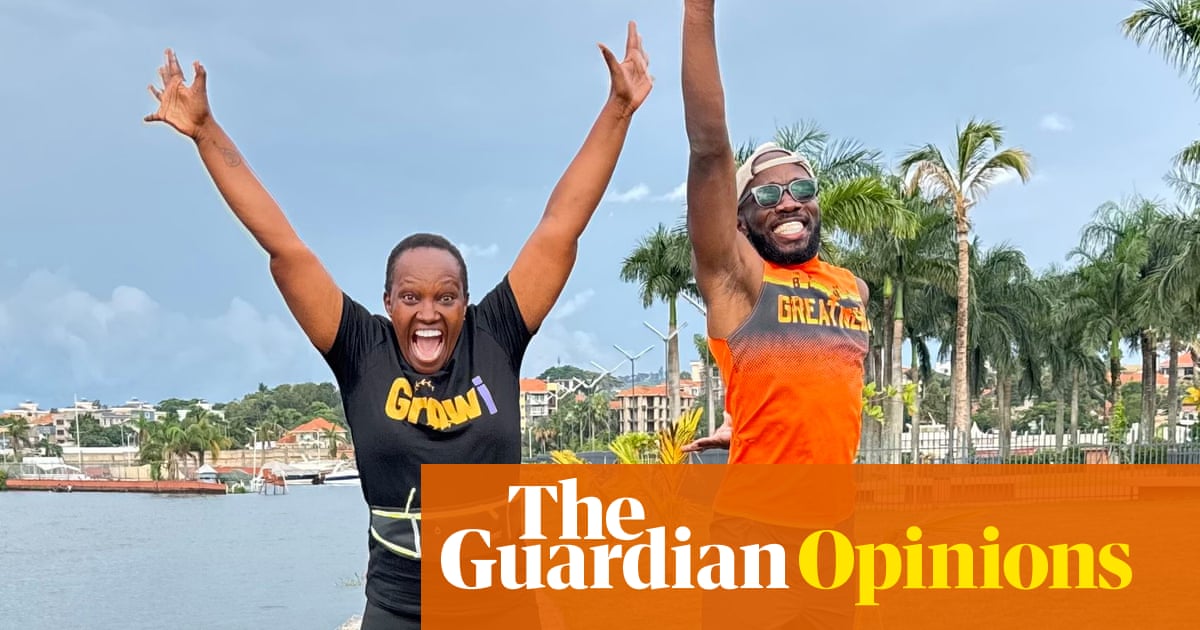In theUgandaof the 1980s, my family lived in Kampala. We did not own a car, so walking was part of daily life: to school, to church, to the market, to the hospital and to visit relatives.
As the eldest child, I often accompanied my mother to Owino market. We would walk there from our neighbourhood, Namirembe, and I’d trail behind her with a basket balanced on my head, collecting the week’s groceries. Those early walks were not just about errands – they were quiet rituals of bonding, observation and endurance.
Years later, in 2015 and 2016, I walked again – but this time in preparation for reaching summits. I gathered a group of friends – Joy, Penny, Bernard, Michelle, my brother Peter – and we trained for our biggest climb yet: Mount Rwenzori on the border of Uganda and the Democratic Republic of the Congo, which we climbed in July 2015.
Those treks taught me about resilience, shared ambition and the quiet strength found in companionship.
Then in 2022, I joined theActivate Uganda100-day challenge, which required walking or running at least 3km daily for 100 consecutive days. What began as a commitment to fitness became something much more profound. The discipline reignited my love for walking, and I’ve walked every day since. Along the way, I was joined by remarkable people including the lawyer and former MP Miria Matembe; the women’s rights activists Florence Butegwa and Hope Chigudu; the MP Rita Atukwasa, and many others.
As a coach for the 2022 mentoring programme I introduced at my company CivSource, I even turned my coaching sessions into walks.
At the start of 2023, I sent a message to my team at CivSourceAfrica. The theme was “moving”. We were in a season of transition – moving offices, launching an affiliate organisation – and I wanted us to embrace change, not resist it.
To deepen those connections, I began holding one-on-one walking meetings with my team. On those walks, we talked about dreams, fears, aspirations and feedback – for themselves and for me as a leader. Movement opened up new dimensions of honesty and trust.
Then came Easter 2023 and another Activate challenge. This time, I dedicated each day of the 100-day challenge to walking with a leader. That’s when the question truly crystallised: what if I used walking not just for health or connection, but as a platform for purpose?
Conversations with Prof Bhekinkosi Moyo, of the Centre for African Philanthropy and Social Investment, and with theroad-safety advocate Joseph Beyanga, affirmed the idea. Both use their physical activity to raise awareness for causes close to their hearts and encouraged me to do the same.
And so Walk.Talk.Connect was born. I officially launched it on 2 June 2023 – initially as “Fridays With Jackie”. I imagined walking with one person a week and walking alone on the other days. My first guest wasAfrie, a gifted singer-songwriter. I posted a picture and a short caption about our walk.
The next Friday, I opened a walking slot on social media. People responded. The pace quickened: from once a week to three times a week to nearly every day.
To date, I have completed 435 walks – and shared a story after each one.
Some days, I walk with more than one person: a couple, a set of twins, an entire team from an organisation. I’ve walked with students and CEOs, artists and ambassadors, friends and strangers. The youngest walk guest was 16; the eldest was my father, who was 83 in 2024. I’ve walked with nearly equal numbers of women and men. And I’ve walked far beyond Uganda – in Nairobi, Dakar, Harare, Bangkok, Johannesburg. Wherever I travel, I walk.
Every walk is unscripted. We let the moment lead. We follow our curiosity. We open ourselves to connection. People have requested walks to mark birthdays, to mourn losses, to launch campaigns. Each story becomes a thread in a growing tapestry of human experience.
Sign up toHer Stage
Hear directly from incredible women from around the world on the issues that matter most to them – from the climate crisis to the arts to sport
after newsletter promotion
I’ve walked through lavish estates and through slums. These walks have made something startlingly clear: Kampala is a city unfriendly to pedestrians. Yet so many of its citizens – especially the most vulnerable – walk daily out of necessity. We must make our cities safer and more walkable for all.
I embrace walking as critical to me as a woman. I do not take mobility for granted. I know that to this day, there are women who cannot move around freely because of strictures arising from the places they live, the religion they are part of, or events such as war.
Walk.Talk.Connect is one of the ways I live out my feminist ideals. With every step, I claim space as a woman – unapologetically. When I walk, I am not just moving through the world, I am moving with intention: to hold space that is inclusive, expansive and alive with possibility.
This is how I affirm that women belong everywhere – including in open spaces, in conversations, and in the shaping of community.
Walk.Talk.Connect is now a platform, a practice, a path. It is how I contribute to the weaving of relationships, ideas, causes and communities. It is how I honour my calling – as a lawyer, a leader, a listener, a lover of stories.
My heart is richer. My steps are steadier. My life is fuller. I live in a state of gratitude – for the road, for the people, for the gift of walking, talking, and connecting.
Jacqueline Asiimwe is a lawyer and founderof CivSource Africa, an African-led firm that advises, resources and reimagines philanthropy to serve communities across the continent
